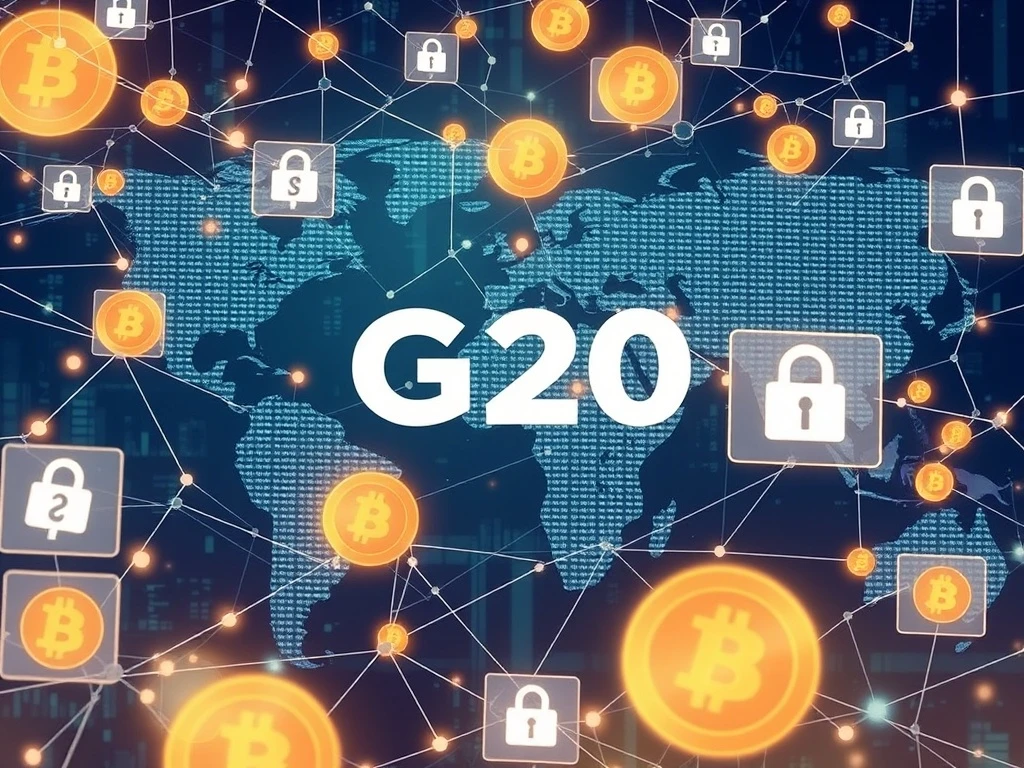Crypto Regulation: Privacy Laws Crucially Hinder Cross-Border Efforts, G20 Watchdog Warns

The cryptocurrency world has matured significantly. Yet, effective Crypto Regulation remains a complex puzzle. A recent report from the G20’s Financial Stability Board (FSB) highlights a major hurdle: Privacy Laws. These laws increasingly complicate cross-border cooperation efforts. Consequently, they create significant data gaps. Regulators struggle to access reliable Cryptocurrency Data. This ultimately hinders global oversight.
The Alarming Truth: Privacy Laws Hinder Global Crypto Regulation
Bitcoin debuted sixteen years ago. Still, regulators face significant challenges. Accessing reliable Cryptocurrency Data proves difficult. Privacy Laws often complicate these efforts. The Financial Stability Board (FSB), a key G20 risk watchdog, confirms this. It identifies data privacy as a critical legal challenge. This impacts cross-border cooperation in regulating digital assets. These assets include Bitcoin and stablecoins.
The FSB is a global financial authority. It receives funding from the Bank for International Settlements (BIS). It recently released a 107-page peer review report. This report points to persistent gaps. Governments worldwide struggle with consistent Crypto Regulation. “This inconsistency creates challenges such as regulatory arbitrage, data gaps, and market fragmentation,” the FSB stated.
Among the primary issues in cross-border cooperation, the regulator noted several points. These include divided supervisory responsibilities across multiple authorities. Varying regulatory approaches also pose problems. Most notably, Privacy Laws stand out.
Financial Stability Board Unveils Critical Data Gaps
The issue of data confidentiality raises frequent concerns. It impacts identifying potential systemic risks. Thus, it affects efficient supervision of cross-border crypto asset activities. The FSB explicitly stated this. “Secrecy or data privacy laws may pose significant barriers to cooperation,” the regulator wrote. Some jurisdictions restrict local firms. They cannot share data with regulators in other places.
Furthermore, some market players hesitate. They do not share sensitive information. Fears about confidentiality breaches contribute to this. A lack of guaranteed reciprocity also plays a role. These concerns cause delays. They affect cooperation requests. In some cases, they prohibit participation in cooperation arrangements. This hinders effective global Crypto Regulation.
The FSB emphasizes the need to address these challenges. Doing so will foster more effective cooperation. This is crucial in the rapidly evolving crypto-asset landscape. Data privacy is a key blind spot. It prevents effective global Crypto Regulation enforcement. Solutions are urgently needed.
Addressing the Privacy Barrier: A Key Challenge for Cross-Border Cooperation
The crypto community often champions data privacy. It views privacy as a fundamental human right. However, the FSB highlights practical difficulties. It stresses that Cryptocurrency Data providers often lack accuracy. Consistency and comprehensiveness are also missing. “Regulatory data sources remain limited,” the FSB explained. Authorities must rely heavily on commercial data providers. Surveys and other incomplete sources fill the gaps.
This situation creates a precarious environment. Regulators cannot get a full picture. This impacts their ability to ensure financial stability. The FSB flagged similar data provision issues almost four years ago. Progress in improving the quality of Cryptocurrency Data has been slow. This ongoing challenge demands attention.
The Urgency of Reliable Cryptocurrency Data
The current state of Cryptocurrency Data poses risks. Inaccurate information can lead to poor policy decisions. It can also create blind spots for emerging threats. The lack of standardized reporting complicates matters further. For instance, centralized exchanges face claims of massive liquidation undercounts. Such issues underscore the need for better data.
Effective cross-border cooperation depends on shared, reliable information. Without it, individual jurisdictions act in silos. This creates opportunities for regulatory arbitrage. Malicious actors can exploit these gaps. They move funds across borders undetected. This undermines the integrity of the global financial system. Therefore, enhancing Cryptocurrency Data quality is paramount. It is vital for both Crypto Regulation and market integrity.
Charting the Future: Enhancing Global Crypto Regulation
The Financial Stability Board has clearly outlined the problems. Privacy Laws present a significant obstacle. They impede cross-border cooperation. This directly impacts effective Crypto Regulation. The challenge lies in finding a balance. We must protect individual privacy rights. Simultaneously, we must enable sufficient regulatory oversight. This balance is critical for financial stability.
Stakeholders must collaborate. Governments, regulators, and industry players must work together. They need to develop innovative solutions. These solutions should facilitate data exchange. They must also respect privacy principles. Clear international frameworks are essential. These frameworks will standardize data reporting. They will also streamline cooperation mechanisms. Only then can global Crypto Regulation truly advance. The future of the crypto market depends on it.








